Milly
For the Sake of a Soul, 1954-1957
“Brother Ware, we do not agree with your fanatical experience. We had enough of Jon Cowpersmith and his speaking in tongues, and for sure, we will not put up with two of you! You are not to teach or lead in the mission, unless you renounce it. You have two weeks in which to make up your mind.”
As Ted stood before the camp leaders his heart cried out with his New Testament brothers, “We cannot but speak the things which we have seen and heard.”
After many tears, with saddened hearts, Ted and I agreed that we had no choice but to leave our camp family. “I’m going to miss them. No matter where God leads us, I want His blessings to be theirs also,” Ted said as we drove away.
“Why is it that we aren’t bitter or angry, Ted?” I asked.
“Because our experience was from God, and it makes us react as He would.”
“Where is our home now, Daddy?” Clive asked as he saw the woodlands go by.
Nobody spoke for a few minutes. How do you tell your children that, ‘Foxes have holes, and birds have nests, but we have no place to lay our heads?’
“Our car is home now, because we are together in it,” Ted said. This seemed to satisfy Clive.
“Why did you give away your bed, Mummy?” Kevin asked.
We had carried our mattress from our home to the Boot Camp. I had given away my set of china dishes in order to focus on being missionaries. Now as we packed I realized that if we planned to venture forth by faith with the Lord, we couldn’t burden ourselves with all of the ‘comfort trappings’ of the world. The mattress must stay.
“It wouldn’t fit in the car,” I answered Kevin.
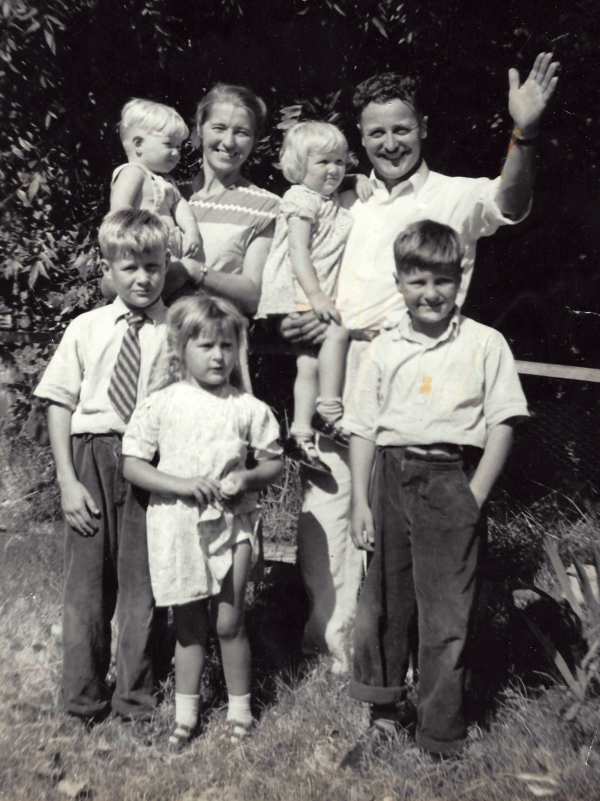
We first drove to Vancouver where Ted wanted to check on some financial opportunities. We knew that we had no money left in England. We had about ten dollars in our pocket, and we owned an old car. However, from the sale of our dream house we were still owed $1500, to be paid to us in installments over many years. We drove to the house and asked the present owner, ”What are the possibilities of your paying your debt to us early?”
The man replied, “Come back tomorrow and I'll let you know.”
So the next day we returned. “I'm going to make one offer,” he said. “If you accept it, fine. If you don't, then the agreement will have to stay as it is.”
So Ted asked, “What's the offer?”
“One thousand dollars in cash.”
“Done,” Ted said, and accepted the cash.
Later that night I asked my husband as we snuggled together in a tiny bed in a friend’s house, our children stacked like little sardines around us, “How did you feel in front of the house? Did you wish that it was ours again?”
“Milly, absolutely not. I’m more certain now than ever that one soul is worth a whole world of houses. If God will just bless us with souls, it will be worth it all. How about you? Do you miss your bed?”
“Yes, I miss it a little. But I wouldn’t trade the peace I have in my heart for every bed in Canada! Ted, where do we start to look for that soul, or souls?”
“Well, with this house money I think we should get a rugged, durable vehicle. Get rid of everything that doesn’t fit in it, and head out. The only destination that comes to my mind is British Guiana. There’s a verse that says, ‘I being in the way, the Lord led me.’ So I think we should get ‘in the way’ and expect him to lead us!”
The next day we went to a vehicle dealer and looked at new Land Rover jeeps. Our $1000 was $200 short of their selling price. Ted and I sat down on a bench in the show room, and discussed how we could make payments on the $200 balance that we needed. At that moment, I looked up and saw an old Christian friend, Bob Lowe, walk into the building. He saw us and came over.
“It’s so good to see you! Whatcha doin' here?”
“Well, buying a jeep, as a matter of fact, to take to the field with us,” Ted said.
“Oh, really? Well, I'd like to have a hand in that! Here.” And without further ado, he made out a check for two hundred dollars.
The God we serve is so big that He can get small enough to know the number of hairs on our heads-and the exact amounts of money it takes to buy a jeep. We bought the Land Rover outright that day, then we packed our worldly goods into it.
“I just added up what we have, Milly. Each other, five children, a new jeep, and fifty dollars.”
Before we left Boot Camp we received a letter from Ted’s family, who had all migrated to Canada. “Mother is in poor health. She has tuberculosis, and her kidneys are failing.”
We traveled to Edmonton to see her. All of our children were allowed into her bedroom. Her eyes got big, “Look, Joe!” she said to Ted’s father. “All five of them are beautiful, and healthy. Look at them, Joe!”
Apparently she’d fretted that our children were malnourished and ill. She marveled at their height, strength, and robust health. “Isn’t this a beautiful baby, Joe!” she said happily patting Paul’s fair head.
Our hearts were heavy when it was time to go. As we drove away Ted said, “Mother pressed a $20 bill into my hand as we left and told me that it was for our children. Wasn’t that kind. I wish that we could have stayed to help her.”
“Yes,” I replied, “I wish that we could have done more, but at least she knows that her grandchildren are fine. I talked to the doctor and he told me that he did not know how long she has to live, and we have too many children to stay in their home with her so ill.” Ted agreed.
We traveled on to Calgary where we knew a minister, Vic Graham, a friend of Jon Cowpersmith. We were welcomed and asked to sing a duet at an afternoon service. We sang “Speak, My Lord,” a song based on Isaiah chapter six:
As we concluded, the minister came behind us, and prophesied a message from the Lord: “My children, I am with you. You have done what I wanted you to do. Go forward. I will lead you.”
I felt a blanket of peace envelope me, and I thought, No matter what happens, if God is leading us, we’ll be all right.
Encouraged, and with an additional $50 love offering from the church, we left Canada, and headed south into America. Ted had heard of a missionary convention going on in “King’s Gardens”, Seattle, Washington, so we stopped there. One of the leaders came to Ted and said, “Brother Ware, you are going to be our speaker.”
Stunned, Ted said, “I can’t do that!”
“Oh yes, you shall. The brother that we expected cannot get here, and the Lord has told us that you are to speak.”
So Ted spoke. I felt the anointing of God as he fervently shared what was in his heart. People responded and admitted that they had been moved in a wonderful way. Many unbelievers became Christians, and those that were not living for God, rededicated their lives to Him.
We received a telegram at this time that said. “Mother died. Left you this message: John 14:1-6.” We knew the passage, but looked it up again:
We read to the end of the chapter and were comforted by the glorious truth of the Word of God. From her message we believed that she supported our commitment. Soon, after our tour of duty on this earth ended, we would see her in Heaven. She would be free from pain and sorrow, and we would never be separated again.
We could not attend the funeral but continued with the meetings. We sang a duet on the radio,
Before the convention was over, Ted had spoken at many Seattle high schools and prisons. We left Seattle with happy hearts, a full gas tank, and fifty dollars, plus many new friends who said they would write to us if we kept in contact with them. One kind woman gave us a packed lunch as we pulled away from the convention grounds.
We went down the coast toward Portland, Oregon. As we chatted in the car there was a loud pop, and the car swerved. “It’s a flat tire,” Ted sighed and pulled the Land Rover to the shoulder.
“Milly, the tire is finished. I’ll put on the spare, then we’ll pull into the next gas station to see what can be done.”
At a gas station I unpacked the lunch we had been given to feed the children. Tucked in the top of the neat basket was a five dollar bill. Just then Ted returned to the car, and said. “The problem can be taken care of for five dollars.” I handed him God’s answer. Isaiah 65: 24, “Before they call, I will answer; and while they are yet speaking will I hear.”
We arrived in Portland and visited a Bible school. Then we continued south on Highway 101. Along that scenic coastal drive Ted affirmed, “Darling, isn’t it wonderful! Each time I check our assets, we still have fifty dollars! We were out of money and then that church gave us an offering! God says that He will supply our needs, and thus far, He has. British Guiana, here we come!”
We researched ways to get to Guiana and found three: drive all the way down through Central America; take a boat from Louisiana across the gulf of Mexico; drive to the tip of Florida and take a boat across from there.
“Which way do you think that we should take?” I asked.
“Well, I think we’ll just see which opens up to us.” Ted replied.
We stopped in Sacramento, California, at a Pentecostal church and found the lively congregation considerably different from any that we had met before. In one service Ted someone prophesied, “You are surrounded by snakes, and being attacked from all sides, but do not fear, it is going to be all right.”
“How are we supposed to interpret that?” I asked Ted after we left the church. I was really concerned about the snakes.
“I’m not sure, but at least the prophecy said that it would end up all right, whatever it means.”
We asked travel agents and others about traveling through Mexico into South America. “There are no roads through southern Mexico, only a railroad, and it doesn’t always work.” We did not know Spanish so we decided to take a boat. It sounded faster and less dangerous.
“What’s the matter, Ted?” I asked Ted, as he appeared withdrawn.
“I keep thinking that the Lord wants us to go to a leprosy colony, and I can’t stand the idea.”
“Oh, I see. Hmmmm. Well, He’ll give us grace sufficient, I’m sure.”
“I’ll go anywhere else, Milly. Just not to a leprosy colony,” he declared and was miserable for days.
He woke me early one morning, and I could tell that his gloom had lifted. “It’s all right, Milly. I told the Lord that it was okay, that I’d go to a leprosy colony. And do you know what He answered?”
Fully awake, I answered, “No, Ted, what?”
“That He didn’t really want me to go to a leprosy colony; He just wanted me willing to go!” I rejoiced with him.
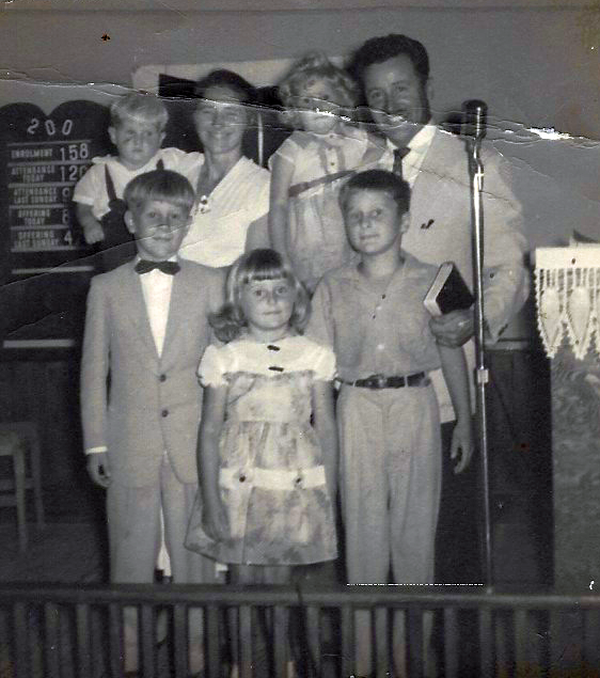
Since we had many miles to travel, Ted built a little tent trailer for us to sleep in. We left California with more new friends, a jeep with a trailer, fifty dollars, and a church to contact. We were told that a church in Dallas, Texas wanted us to stop and see them on our way through.
When we arrived in Dallas, the minister was delighted. “You're just the ones I need! I have a Faith Home here, and my nurse has been on duty for a month with no time off. Would you give her a vacation? I will pay you well for your work.”
This seemed like a need that we should fill so I went to work in the Home and Ted cared for the children.
The home was overcrowded with people, all believing that they would get healed. They sang songs and quoted Scripture at four and five o'clock each morning. This was admirable, but I was concerned that I did not witness any miracles. Some people had been there for a long time. Another concern that I had was the administration’s attitude about money. The sick people paid to live in the building, but the money was not used for the welfare of the patients. On one occasion the minister asked the congregation to give our family a love offering. He kept all that was given but gave us ten dollars!
After two weeks at the Faith Home the nurse returned. As we said goodbye, a blind old man gave Ted fifty cents, and a child gave him a penny. The ten dollars had gone earlier for food and gas, so we left with exactly fifty-one cents.
Our next stop was Houston, Texas, at a faith mission that had been recommended to us. This minister said, “Oh, It’s good to see you! There’s an apartment above the church that you're welcome to stay in. The freezer's full of food; just go up there and enjoy the weekend.”
The next morning was Sunday so our family attended church. A wonderful communion service was served around long tables. It was a sacred, beautiful experience.
Later that day we were invited by the pastor, “We're having another meeting this afternoon if you want to come down to it.” We took the children and sat on the front seat. Following the service people started to dance in worship to the Lord in the front of the church. The dancing was appropriate but totally strange to us.
A man came up to me and reached for Paul, who was two years old, and whispered, “I'll look after your children so you can dance.”
I said, “No, no, no, thank you.”
Three times people came up and offered to watch our children so we could dance. The last person said, “The Lord has told me to look after your children.” So we left the children and joined the dancers.
I stood alone, then closed my eyes and moved slowly around worshipping the Lord, oblivious to who or what was around. Minutes later, when I opened my eyes, I tugged on Ted’s arm. We were the only two up front! Everyone else was seated.
The minister stood and announced, “The Lord has separated this couple for us to give them a love offering. Now I know we don't know them, but this is the Lord, and I want you to come up and bless them.”
He turned to Ted and said, “Open your Bible, brother.” Ted opened his Bible, and people came up and piled his Bible high with money. There was money everywhere.
Almost speechless after witnessing this miracle, Ted said to the minister, “You know, all of my life I've wondered what it would be like to run around a church, and I feel like running. Would it be all right if I ran around the room?”
“Yes, do it.”
So Ted ran around the church, and what do you think happened? The fifty-cent piece he was given earlier in the other church fell out of his pocket.
He stooped to retrieve it, and the Lord spoke to him, “I am no man's debtor. You were a blessing, now I'm blessing you. My Word says, Give and it shall be given unto you, good measure, pressed down and running over.”
That night there was yet another service. The minister’s sermon title: “And the iron did swim,” taken from II Kings 6:6. This Scripture portion describes how Elijah spoke and an ax floated!
I thought, We need our jeep to float all the way to South America!
At the end of the service the minister said, “If you have anything in your hearts against anybody, stand up in your seat. Imagine you've got those bad feelings and thoughts in your hand, then throw them, and never think of them again.”
Everybody got up and started to throw the imaginary things into God’s Sea of Forgetfulness. I thought of a few things from the past, so started to throw along with everyone else. I went all the way back to my childhood. I went through my nursing experience, and into Canada, forgiving as memories of unkindness that came to my memory. I threw some things from the boot camp experience and days in Texas into God’s Forgetfulness Sea. I even forgave myself and threw in some of my own faults and sins!
That night as Ted and I went to bed I said, “I’m sure glad that God led us here. I feel clean and refreshed.”
“Yes, it has been wonderful. A man came to me after church and wanted my car keys. I trusted him with them, and he returned our car full of gas. Also, the offering from the church congregation was fifty dollars!”
From Houston, Texas, we headed for New Orleans, Louisiana, where we heard that there was a shipping company that had freighters that traveled back and forth to South America. After Ted located the company, he came out of their office looking depressed.
“What did they say? “ Clive asked.
“They said that it would cost $1,500 to get us and the jeep to South America.” He stepped back into the jeep, and started the engine.
“So what shall we do, dear?” I asked.
“There are other ports and shipping companies along the coast. At the end of Florida there have to be ways to get to South America; we’ll just keep on traveling until we get to the end.”
Our next stop was Mobile, Alabama. Ted parked the jeep and went into a store for some groceries while I sat in the car with the children. A stranger came up to my window and asked about our vehicle and where we were going. “The Lord has told me to take you home.”
Shocked, I said, “Oh, really!”
“I'm serious,” he insisted. “The Lord has told me to take your family home. I am a minister, and I'll be very pleased when your husband comes out, if you’ll follow me home.”
When Ted appeared, he met the minister, and agreed to follow
The pastor opened his church to us for meetings every night, also, we were invited out to many homes where we were served fried chicken for breakfast, lunch and supper! We'd never had so much fried chicken in our lives.
As we left Mobile, Ted informed us, “I just made a count: I’ve got my wonderful wife, five children, the jeep, and fifty dollars!”
In Florida we stopped in Lakeland to visit the parents of some dear friends we had met in the California boot camp. They welcomed us as family. Before we left, they insisted that they would administer all our missionary correspondence. They maintained a current file of all interested persons in our mission and printed and mailed our newsletters to those on that list.
While we were staying there, the children spent many happy hours riding horses and playing in the creek in the back yard. One afternoon I overheard our children in a heated discussion. Clive argued, “His name is Eddie.”
“No it isn’t, it’s Ted,” Heather announced emphatically.
“His name is Edward Philip Ware, and sometimes people call him those other names,” Kevin said.
“I know his real name,” our toddler Joy said. “It’s Daddy.”
As I listened I realized that I had contributed to their confusion. I decided to call Eddie ‘Ted’ in the future, to eliminate some of their confusion.
From Lakeland we traveled south to the tip of the mainland of America, the Florida Keys. When we arrived in Key West we were told at the dock that the cost to travel to South America was over $1,000.
Distressed by this “impossible” obstacle, Ted drove us to a beach where I prepared a picnic. Since we did not have the needed $1,000, Ted went for a walk to pray for guidance. As I prepared the sandwiches and fed the children, I watched him wade into the water. Next he raised his arms into the air. Half of an hour later he came back to the picnic table radiant.
Joyfully he shared what the Lord had revealed to him. “I know what we’re supposed to do!”
“Wonderful! What?” I asked.
“Well, I walked to the water’s edge and felt that the Lord wanted me to take my shoes off, so I did. Then I waded into the water. I told the Lord that we had done all that we knew to do, that unless He supplied the funds, we couldn’t go anywhere. Then I felt that He said, ‘Are you done talking?’ So I said, ‘yes.’ Then He told me that He did not want us to go to British Guiana. That was the reason that He had not supplied funds.
‘I want you to go to Cuba, which is but 70 miles from where you are standing.’ So I believe that is what we need to do!”
I gulped, “All right Eddie, (I forgot about my resolve to call him Ted) then that’s where we’ll go.”
We found an inexpensive fare, which included our jeep. Soon we were on a ferry to Cuba!
It was a beautiful, breezy day. Ted and I sat together on deck chairs and played with Joy and Paul. We all enjoyed watching the seagulls land on the deck and take crumbs of bread from passengers. Someone standing at the rail suddenly shouted, “Look at the flying fish!”
Kevin, Clive and four-year old Heather ran to the edge of the ferry to see the fish with wings!
Our “jeep-home” was so small the children were permitted only one toy each. Needless to say, Heather’s doll was her constant companion. To give her doll a closer look at the flying fish, she hung it over the rail. A sudden gust of wind caught Heather off balance, pulling her treasure from her tiny hand. It was a few seconds before she realized what had happened. Aghast, she watched over the rail as her beloved toy was engulfed by six-foot waves.
“My dolly’s gone to be with Jesus!” she whispered. Tears ran down her cheeks.
A kind woman standing nearby heard her and asked, “Little girl, would you please take me to your parents?”
Heather brought her to where we were. “My name is Maxine Richardson. Your little girl says that ‘her dolly went to be with Jesus’. Would you happen to be Christians?”
“Oh, yes indeed we are,” we said.
“I am also! I’m a missionary!”
“Well, we are, too!”
“Which denomination are you with?” she questioned.
“Well, no group, actually. We’ve had a Pentecostal experience, but we’re not with any denomination.”
“So where are you going in Cuba? Do you have a vehicle?” she queried. “Of course, you speak Spanish.”
“We’re going wherever God leads us; and yes, we have a vehicle; but we do not speak Spanish, yet.”
The woman learned that we were missionaries to Cuba but surprisingly could not speak Spanish! She sat down on a vacant chair next to us and was silent for a few minutes.
“Maybe we can help each other. I need to get some barrels of supplies over to where I live at a Bible school. If you would carry me and my belongings, I could help you through customs, take you to where we work, then you would have time to decide what you should do next!”
We agreed. When we arrived in Cuba, Ted drove our vehicle off the ferry, and strapped the woman’s barrels onto the back of our jeep. I pushed things around inside, the children “doubled up”, and somehow we all managed to cram in and close the door.
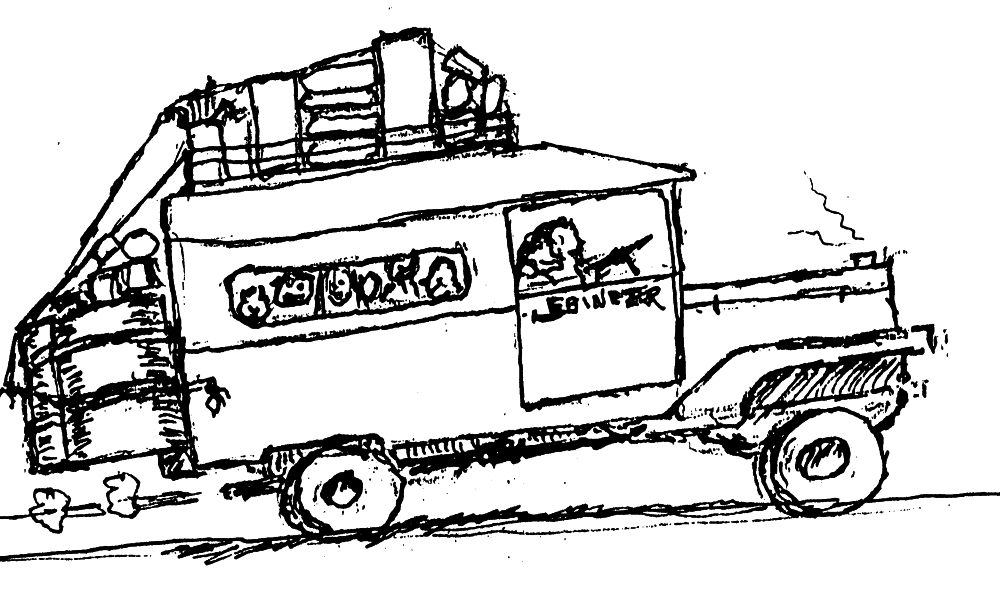
HEADING INLAND
We headed out of busy Havana and a few hours later arrived at the missionary woman’s headquarters. The Bible school welcomed us. In the morning we heard voices sing Christian songs in Spanish. How we wanted to join in with them in their beautiful language!
One day, as Ted was walking to the Bible school, he met an acquaintance from our original missionary training group, Buck Northrop.
“What are you doing here, Ted?” he asked.
They had a good visit recounting life since training camp. “I left the mission, too,” he said, “ and am working in a town further east. We have a farm and a church there. Why don’t you come and work with us? There are two houses on the property. My family lives in the front one. The back building will be ready for occupancy in a few weeks.”
“Well, it sounds like a good place to begin,” Ted said.
On the following day we followed Buck to his church in Camajuani. Temporarily we moved into a small apartment in town.
Everything was strange and new. Our neighbors lived so close that all day we heard their conversations but did not understand any of it. We heard their children crying, but we could not figure out why. Sometimes they laughed. For all we knew, they were laughing at us!
During this time of adjustment, Ted became extremely ill. I told our children, “Daddy has malaria. I am going to have to rely on you to help me, as I will have to nurse him.”
We all gathered around Ted’s bed and prayed. He smiled weakly at us. The next few weeks were very difficult. One minute Ted shivered, the next minute he drenched the bed with perspiration. Most of the time he was delirious. Buck Northrup came often and brought soup, fruit, and did whatever he could to help.
I became physically and emotionally exhausted. One day as I hand-washed Ted’s sheets for the second time that day, I wondered if we had made a mistake to come to Cuba. Could this illness be considered the prophesied “snakes”? Up to this point I had found tarantulas in the apartment, but no snakes!
After three weeks Ted was well enough to sit up, shortly after he was able to walk. He was twenty pounds lighter when we moved out of the apartment in town to live in the country house behind Buck Northrup’s home. Surrounding our new home there were banana trees and a big mango tree from which we hung a swing for the children.
A few months after we moved to the “finca” (farm), the Northrups returned to America. Since they suggested that we move into their larger house after they vacated it, we did. We decided our missionary work would continue in the country where there was no congregation. We noted that the town church had many missionaries and didn’t need us. In the meantime, we could work on improving our Spanish speaking skills.
The first few times that Ted preached in Spanish he drew good-humored laughs from the congregation. “The Epistle of Paul” came out “The Pistol of Paul” (Epistola = Epistle, Pistola = pistol). Another time he greeted the people as “Dear ladies and horses!” (Caballo = horse, and Caballero = gentlemen). Everyone took these mistakes with good humor as his Spanish slowly improved.
As soon as we had an address, we wrote to our friends in England, America and Canada, as well as the Jensens in Lakeland, about our new work in Cuba.
After a few months, donations came trickling in. The Canadian retired school-teacher, who I had thought looked like a witch when we first met her, sent us a five dollar bill carefully sewn onto a letter with black thread. A small church that we had visited on our way through California sent a check for ten dollars. We reported all the money that arrived in Cuba to the Jensens in Lakeland, who sent the donors our newsletter and receipts. Money came in slowly, only as we needed it, nothing more.
Careful with what we called ”God’s money,” (which happened to be the only kind we had) we did not spend frivolously. Even though Heather wanted another doll to replace the one that had “gone to be with Jesus,” Ted could not conscientiously buy one with “God’s money.” Happily, a few months later we were sent funds that were designated specifically for the family and Heather received a little doll.
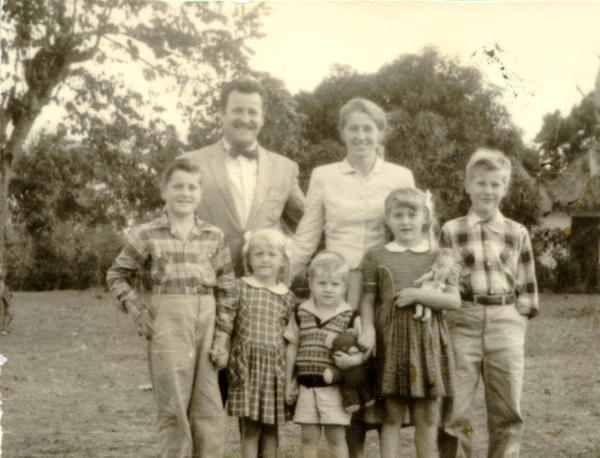
Children from left to right: Clive, Joy, Paul, Heather with her new doll, and Kevin
On one occasion our family was invited to eat at a Cuban family’s home. The staple foods in Cuba are rice and black beans, with a slice of fried plantain banana on the side. Each of us was given a large plate of food. The children looked at us helplessly. The Bible tells us to eat such as is set before us, so we nodded to the children to try to clean their plates as we required at home. The precious “little missionaries” did a valiant job, and at last they had clean plates. To our horror, no sooner had each of us finished, our plates were refilled! Later we learned the Cuban custom. A clean plate is a signal to the host that you want more food!
Over time we adjusted to the differences in cultures and to the strange new foods. We soon decided that the food was tasty and enjoyable!
Almost every night, we held open-air meetings in villages in the country. The campesinos worked their fields during the day and at night were drawn to the vocal music and trumpet playing. They also found our Coleman lantern and battery driven PA system fascinating. A native speaker was always on hand to speak. Ted saw himself as a catalyst missionary to start the spiritual fire; then move on to spark more fires.
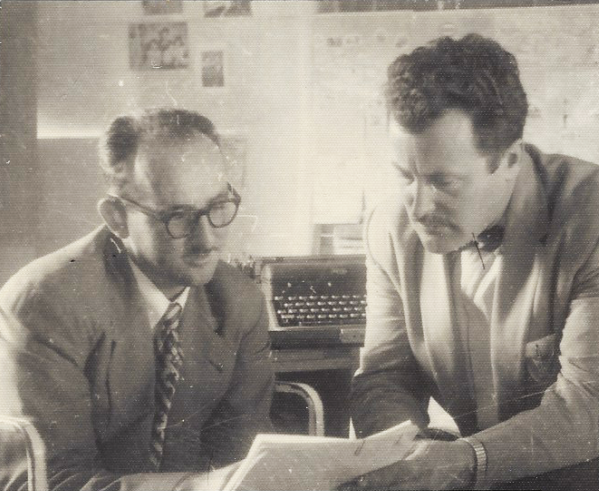
After the Northrups left for America new missionaries replaced them. They did not agree with our goals, but adamantly asserted that things must be done their way. “Their way” did not include the “campesino” work. Ted and I then decided to continue our work independently.
We moved to a 200’x 600’ property outside of a town called Tarafa, where a country, Cuban house was built for us. These simple houses are made entirely from the beautiful, sixty-foot tall Cuban Royal palm tree. Protected by the government, special permission is required to cut them down to build a house. Ted watched in awe as our home was built. The trunk of the tree was split in half to make the walls. The dried branches became the roof and the green fronds were used to tie the dry thatch in place. The bark from under the fronds was used to cover the crown of the roof where the thatch met, to keep the rain out. The finishing touches were the cement floor, the hinged-board windows, and simple wooden front door. A well with a bucket supplied the water and there was an outhouse.
A railroad track crossed the main street in front of our house. Along with the train noises there were the constant sound of car horns being used. Cubans used their horns to say hello and goodbye. Taxis, all big American cars with beefed up horns, honked indiscriminately and continually.
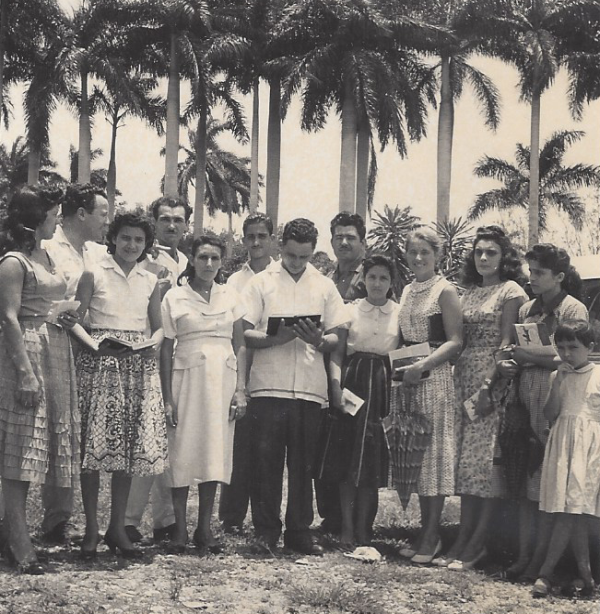
After we settled into our new home we sent Kevin and Clive to local Cuban schools. This arrangement did not work out very well, since they did not know Spanish, and I also worried that they would miss the basics in their education. The children became fluent in Spanish in six months. During that time, I had decided to home school them by a correspondence course to assure their basic education.
One day Adelle came to our home. She said that she was a Christian and asked if she could stay with us and learn English. She offered to help around the house and with the children. She was a Godsend.
At first Adelle cared for Heather, Joy and Paul while I taught Kevin and Clive. Our school day began at 8:00AM with Bible reading and prayer. The subjects: mathematics, English language and social studies filled the rest of the morning. Unfortunately, the children had no art or sports training.
Visitors from America often requested to use our children as their interpreter, but I was adamant that each child’s lesson be completed first. Clive did not enjoy schoolwork. He wanted to be outside with animals and bugs. In Cuba there were many: rats, mice, frogs, scorpions, mosquitoes, Caballo del Diablo (Devil’s Horse, flies with horrible stings) and centipedes. Also our yard housed hundreds of tarantulas. Clive collected them in our metal bathtub. He tricked them from their holes by tapping lightly on the ground, which apparently sounded to the ugly creatures like rain. As the tarantula emerged, Clive the naturalist, prodded it onto the end of a long stick, then quickly transferred the stick with the tarantula end into the tub. A little tap and it fell in. Sometimes a spider fell off of the stick before it reached the tub. Then Clive scurried around it until it reluctantly got back onto the stick. In a very short time, the bottom of the tub was covered with tarantulas crawling over each another.
One evening Ted found all of his children in the back yard bent over the tub, admiring the amazing creatures. He asked Clive to dispose of them.
If at any time a visitor desired to see a tarantula, Clive knew how to quickly find one. Since he would first look in our thatch rafters, I wondered if he hadn’t “disposed” of some of them there.
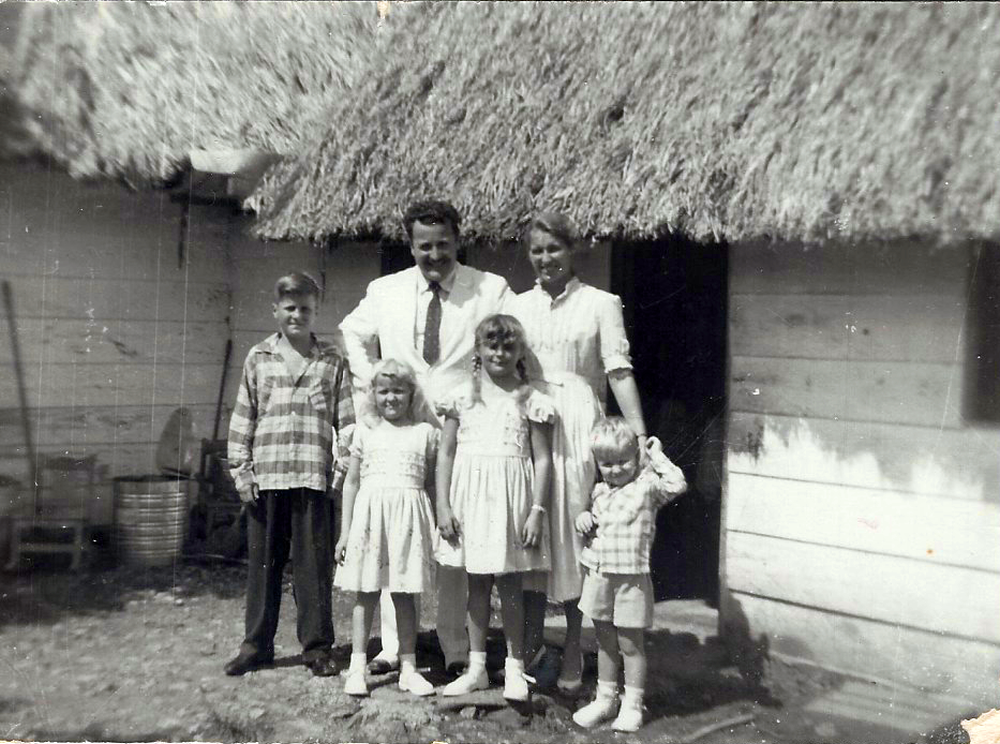
Cuba was also a land of frogs. One particular large, green, banana tree frog had elongated legs and fingers with suckers on each fingertip. These suckers were obviously designed by God so that the frog could climb up the slick banana tree trunk. Ted loathed frogs, particularly if they appeared in our thatched ceiling. We never knew when one would appear right by our side, or in front of us, or on us.
One night it was very hot and humid. Over each bed was a mosquito net, but during this night Ted removed our net to feel more airflow. Still unable to sleep because of the heat, he also took his pajama top off. He then lay in bed and tried to get some sleep. All of a sudden, I heard a yell to wake the dead! One of the huge frogs with the sucker type fingers had jumped onto Ted’s bare chest! He grabbed the frog and threw it across the room, then continued to yell, “ Clive! Clive! Come quick! Get this creature out of here!” Clive was pleased that he was the official amphibian remover!
In addition to their schoolwork, we taught them other skills. To teach the children responsibility, we allowed each of them to have their own animal. Clive owned a cockerel that he had raised from a little ball of fluff. It had grown big and strong and had beautiful, brightly-colored plumage. It lived in a tree beside the house and each morning woke us up with its crowing. We almost depended on it to wake us up. One morning, however, it did not crow. It had disappeared!
Clive became very sad. “Mum, where could my cockerel have gone? It never leaves the area around our house.”
“Maybe a dog got it, Clive.”
“No, I’ve seen it around dogs and it always flies up into its tree!”
“Well, Clive, we can certainly pray, and ask God to bring it back home for you.”
“Yes, let’s pray,” Clive agreed. We prayed that the bird would come back, and after the prayer Clive was sure that it would return.
A long week went by. Half way through the second week Clive happened to be over at the neighbor’s yard and found his cockerel, unquestionably his cockerel, in a pen. Cubans enjoyed cockfights, and because Clive’s bird was so big and beautiful, the neighbor’s teenager had taken it to train to cockfight. When Clive saw it, he told the boy’s father, “That's my cockerel!”
The father said, “Really?” Then turned to his son, “Did you steal this boy’s cockerel?”
“Oh no, no!” the teenager assured his father.
“Undo the pen. If it's Clive's cockerel, it will know where it belongs,” the wise adult said. The latch on the pen was undone and the cockerel strutted across the field, through the hedge, to its own tree, and cried, “cock-a doodle-do!” Apparently, God counts more than just sparrows!
We also had other animals. We used our horses for the Christian work, and sometimes we rode as a family along the dirt path by the railroad. As we rode out of town, the country opened up into fields, the tall Royal Palms swaying overhead. Oxen plowed the rows of tobacco and sugar cane. Thatch-roofed huts dotted the landscape where the farmers lived. Bordering the farmer’s property, special sticks were hammered into the earth that took root and grew into beautiful tree fences. We often continued our ride outside of town to a river and swam in the cool water.
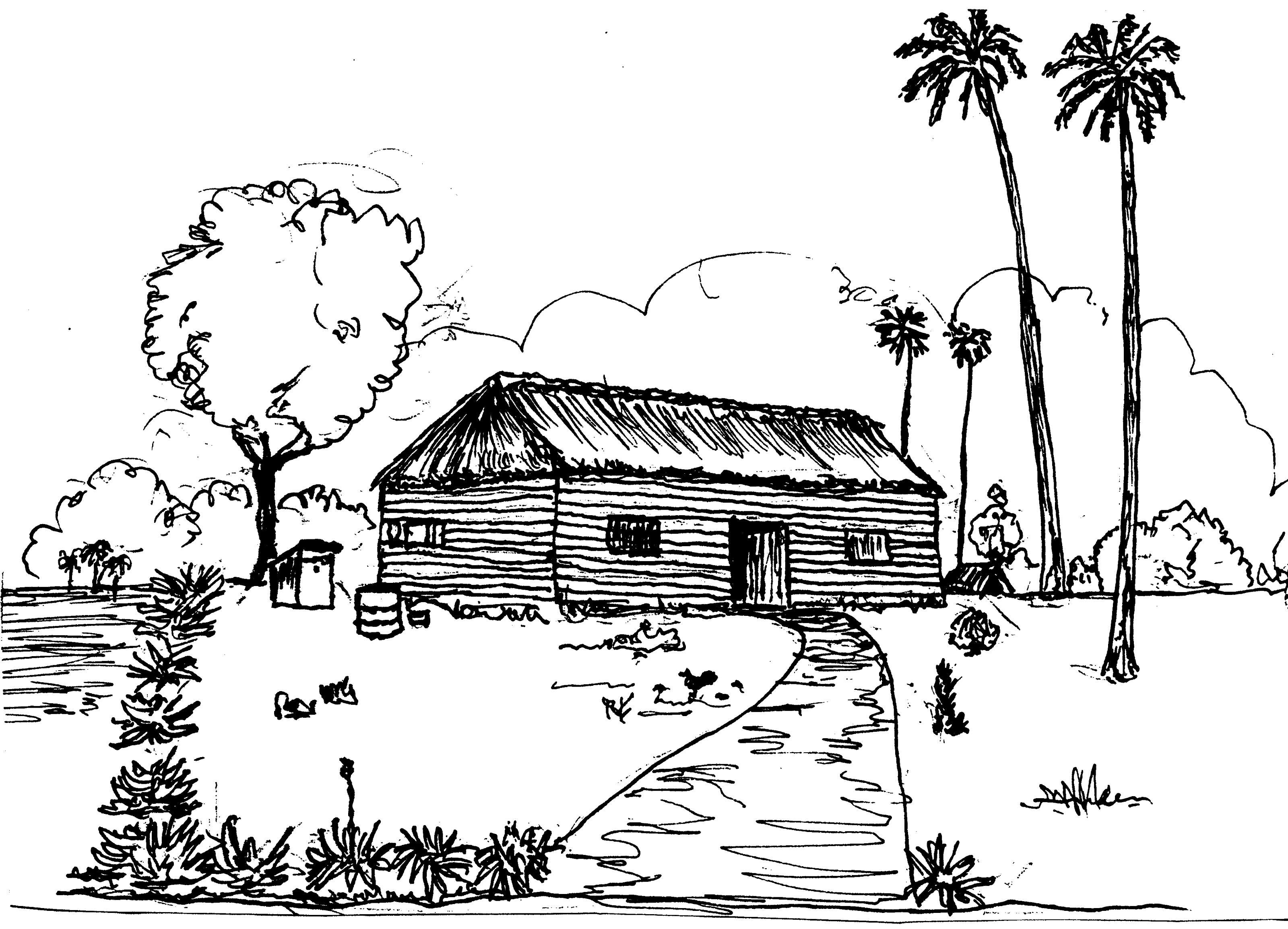
A CUBAN “CAMPESINO” HOUSE
Occasionally our postman advised us that a parcel had arrived from America. Before we were able to take it from the post office, we were always required to pay high “Aduana” (import taxes) on it. The contents were rarely worth the cost of the tax. An example is a parcel containing a skirt, with a burn the shape of an iron, and a roll of twelve-inch pieces of broken string wound together! That was the contents of one package!
I often thought that if I had the time I could possibly make something out of these discards, but being busy with the work, there was never enough time! Also, I did not have a sewing machine.
One year, however, I hand-sewed Joy and Heather each a dress, with some fabric that I bought locally. I took extra time to embroider flowers on the front. When the girls wore them they looked pretty. To my chagrin, the day that I washed them they disintegrated. The fabric was rotten!
One time a parcel came from someone who sent us a real treat, a little jar of strawberry jam! How we stretched that dulce (sweet)! We allocated a small amount each week to each member of the family. One day the strawberry “treasure” was on the table when a Cuban worker came for lunch. We often invited native workers to eat with us. He plopped the entire month’s ration of our treat onto his plate, as we salivating watched him devour it.
It was understandable that we were never overjoyed when we were notified of a parcel’s arrival, so at another time, when we were told that a parcel awaited us, “Oh, no,” I groaned to Ted. But this one was different. Some of the congregation we’d met in Alabama sent it, and obviously they had prayed over it. The post office also amazed us because they did not require any aduana on it, even though it was a sizable box! Inside the box were two sets of brand new clothes for everyone in the family. Everything fit perfectly. A true gift from heaven.

Our missionary work began to flourish as native workers from Cuba’s Bible Colleges and other missionaries came to help. One night Ted and I discussed the need for a bigger vehicle. “Our little jeep is not big enough to carry the workers, equipment and the literature we need.” We then purchased a larger jeep, and traded in the smaller one.
We also upgraded our home to a large house in Santa Clara, a much bigger town. Since there was a front room to sort and store Christian literature and rooms for guests to stay, we moved into it.
God also sent Kathy U’Ren from Washington state to help with the work. Adelle did not move with us to Santa Clara, so I was happy to have Kathy assist with the household and secretarial work. She also played the accordion. This was an asset in the country services. Len and Connie Hearn came from Canada with their daughter Marguerite and lived in a small house across the street.
Our missionary outreach kept us all so busy that we paid little attention to Cuban politics. The country farmers were too occupied eking out an existence, to worry about who their nation’s leaders were. Batista, the present president of the country, allowed religious freedom which made it possible for us to distribute literature and hold meetings wherever there was interest.
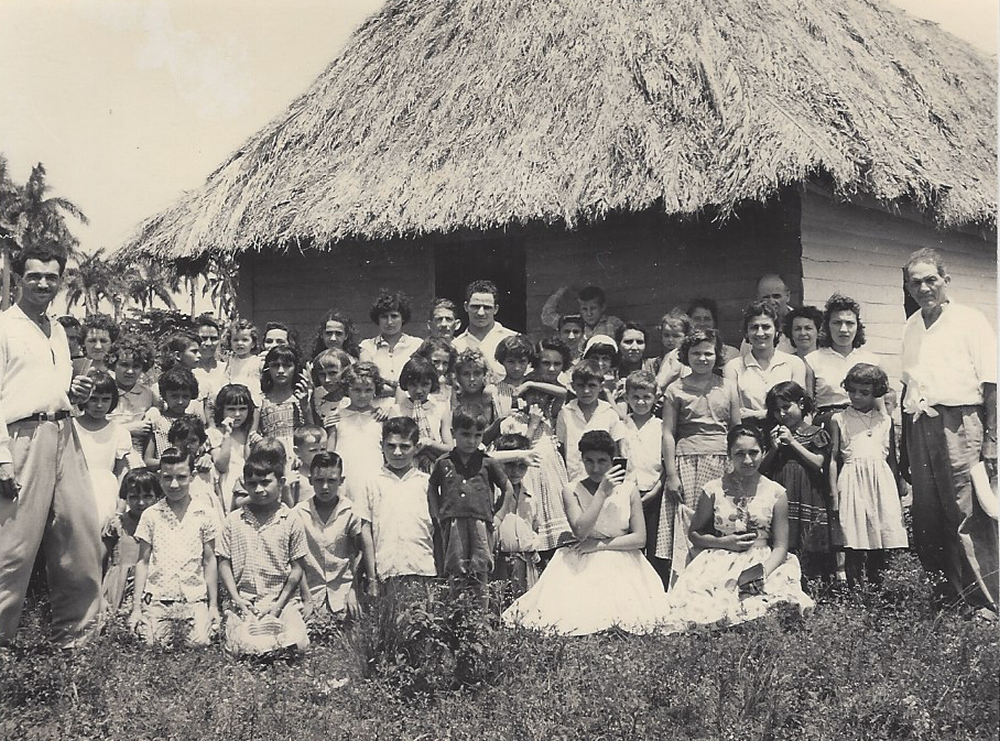
In 1958, Fidel Castro started a major campaign to overthrow the Batista government. Using guerrilla tactics he began in the eastern tip of the country. By the time he reached our central location, he had his system in place. Over short wave radio he made regular broadcasts: “Revolt! Strike! Light fires in the streets! I bring to Cuba a wonderful new era of wealth and happiness!”
The populace ignored his demands, his expectations, so he broadcast another message: “You are now under a curfew. Anyone found out of their homes after 10:00 o’clock at night will be shot.”
At first, the people laughed, since this threat would hinder their customs. One practice that all of the youth enjoyed was on Saturday and Sunday nights. The boys walked around the town square in one direction, and the girls walked in the other. As they passed and eyed each other, friendships developed. By the end of the evening, they all walked in one direction in pairs. This, and other nighttime activities, ceased after many people were shot.
Fidel’s men literally burned many bridges. Their favorite tactic was to ambush buses on the one-lane bridges, empty them of people and burn them. This accomplished two things. It destroyed the bus, and the bus’s gasoline fueled the burning of the bridge. Over most of the rivers there was an alternate route, so traffic was crippled but not stopped.
In late 1958, a neighbor was taken from his home by Batista’s soldiers. We never saw him again. Military vehicles often drove by, full of men with guns. We were told about young men leaving town and joining up with Castro. Realizing that it was a dangerous time, we always prayed before engaging the engine on our vehicle to go anywhere.